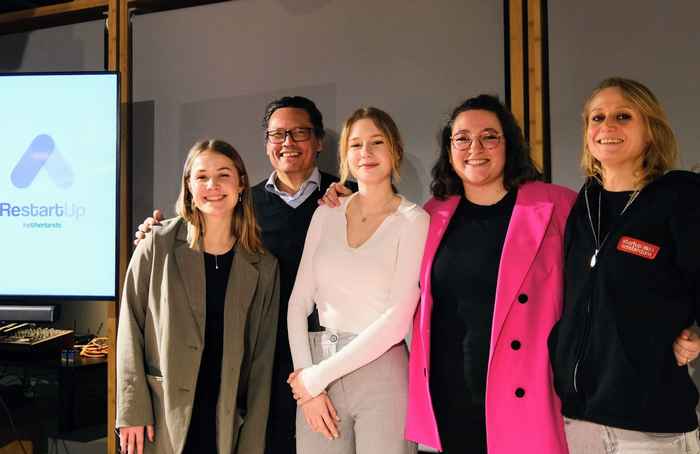Founding your own startup to improve the legal sector? This Justice Entrepreneurship student did it!
13 December 2022

The world of tech and law
'I must say that I have a somewhat unconventional background. I started my academic journey by studying at University College Twente (a Technology, Liberal Arts, and Sciences degree) which combined subjects of engineering, social sciences, and humanities. Throughout my studies I firstly focused on design engineering, having multiple projects in product design, data visualization, design sketching, and graphic design. I always wished to create a product of my own one day, so, I would say that entrepreneurship has been on my mind from very early on. However, after my first academic year, I had a chance to branch out further into social sciences, such as political studies, international relations, and governance, and very quickly (from only having one course in international law) I realized that I was falling in love with law, but also becoming extremely interested in the extraordinary intersection of legal science and the worlds of technology. By the end of my bachelor’s degree, I specialized in European and International law and Technology, also having my thesis on Big Tech company M&A control. Therefore, further specializing at UvA in European Private (and corporate law), felt like a natural progression in my legal career.
I am a strong believer that the world's complex problems could never be mitigated or solved by only one discipline, but by very multidisciplinary approaches, where multiple sciences and experts need to be involved. However, our educational systems very often only offer studies where there is no opportunity to deviate from one science, one mindset, and one path. So when I chose to continue studying law, I was disappointed to see that there were very limited possibilities to do projects that would also combine my interdisciplinary background. That is before I found the course of Justice Entrepreneurship (J.E.). As I already mentioned, from very early on, I always had in the back of my mind that one day I would like to open up my own start-up tackling a problem I find very important, nevertheless, before the J.E. course, I did not find this dream as something that would happen in the near future. Therefore, the type of learning I experienced in the course, really offered me that small little final push, to be able to pursue something I was really passionate about.
I think that definitely one of the most valuable things I had a chance to learn as a part of the Justice Entrepreneurship course, was the practical application of legal knowledge. This gave me a chance to simulate the process it would take me to actually create a company that would address an issue in the legal sector, which made this course unconventional compared to any other educational project I had in my master's. It was genuinely very useful to also have law hub directors, as well as guest lecturers, teach us how to go through a journey most of them did themselves. Such an experience is rare to have in most traditional academic courses.'
I wish that we encourage people to fight the stigma and negative connotation that comes with the word “failure” in the entrepreneurship world

A startup to help other startups
'RestartUp Netherlands, was a very exciting idea we got to develop in the Justice Entrepreneurship course. Siske and I got matched to think of an idea together, and we looked into the topics that interest us both. She had experience seeing how insolvency lawyers and trustees work, and I was really excited to create a legal tech product that would mitigate some of the issues that the world of insolvency law has. Therefore, we came up with the idea to create a start-up project also in line with the great research of Ph.D. researcher Sarah Herzog that showed the stressful situation entrepreneurs experience when needing to shut down their business. From there RestartUp was born: A one-stop shop that offers information and tools that can help you understand all the possibilities an entrepreneur can face before, after, and during the insolvency of a business. This is done with legal design and automating the knowledge delivery to create the most suitable and easily accessible solution for entrepreneurs, as unfortunately, the current ecosystem provides very limited support and information for the vast majority of small businesses and start-ups. With this project, we work on facilitating a better understanding of entrepreneurs of their financial and legal situation, while simultaneously encouraging them to “re-start” again if one of their endeavors might not have turned out as they firstly expected.
Considering that, as I said, the current situation entrepreneurs face in the Netherlands provides a very uncomfortable and undesirable experience, the long-term vision and mission for RestartUp is to offer a free all-encompassing tool that can be used by anyone that wishes to do so, while not needed to rely exclusively on expensive legal counsels. Ideally, I also wish that we encourage people to fight the stigma and negative connotation that comes with the word “failure” in the entrepreneurship world. We are extremely happy to be working on this project with a team that includes the wonderful Frances Singleton-Clift and Einar Horbeek, and to also have the support of Gemeente Amsterdam, Startup Amsterdam, UvA and the Law hub to help reach as many entrepreneurs that struggle with similar situations.'
Be the next justice entrepreneur
'I would definitely recommend this course to anyone that studies law, even if they might not have any entrepreneurial ideas, or even if they do not feel like such a course is within their comfort zone. I say this because this course will give you a much better perspective of the possibilities you have after your studies in the legal field, way beyond the traditional “law firm” career. Even though Justice Entrepreneurship and legal design are not necessarily exclusively connected to the legal tech sector, but also offer many other possibilities to explore, in this course, I loved that I was able to experience what it is like to innovate and digitalize some aspects of legal systems, which you will have to deal with even in the best law firms and as a lawyer. This perspective will definitely make you more open-minded toward using your legal knowledge in many other directions that no one told you about so far in your studies.
Apply now for 2023
Have you also become enthusiastic about the master's course?